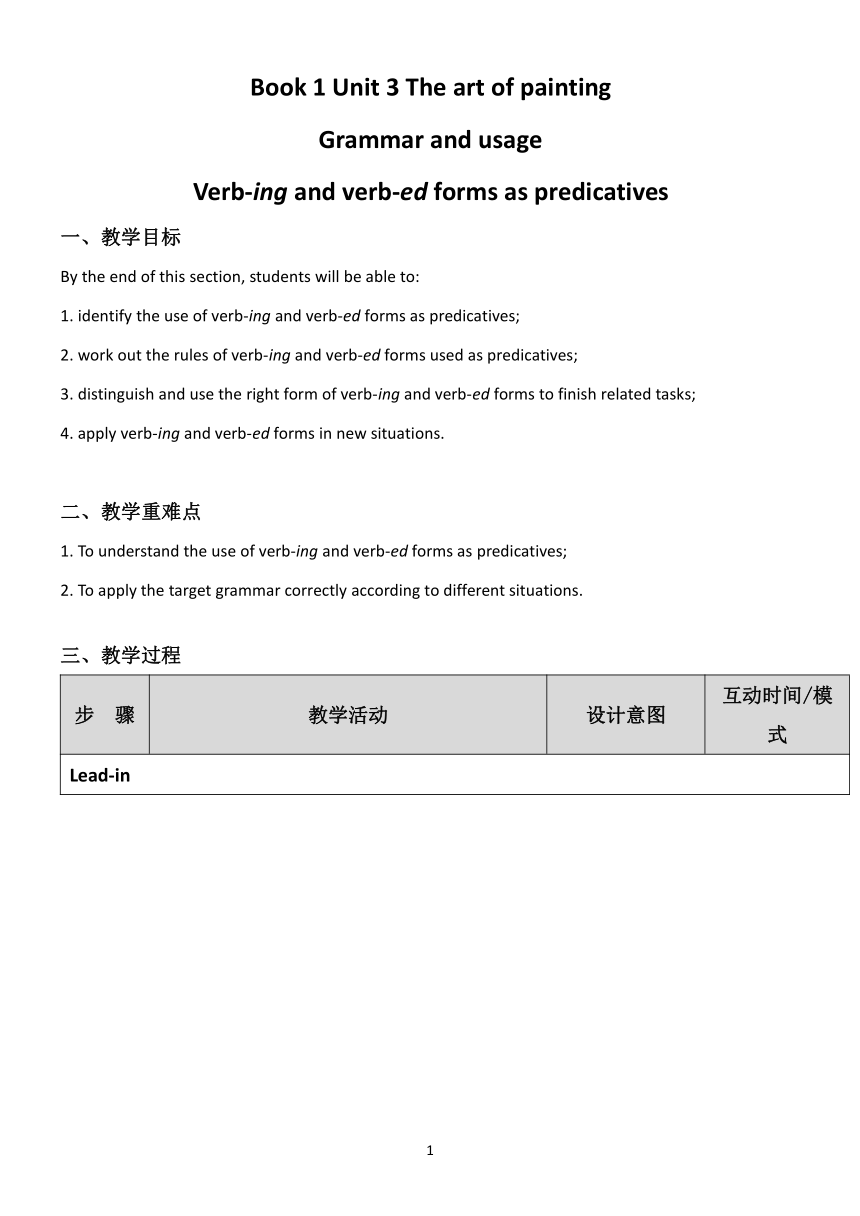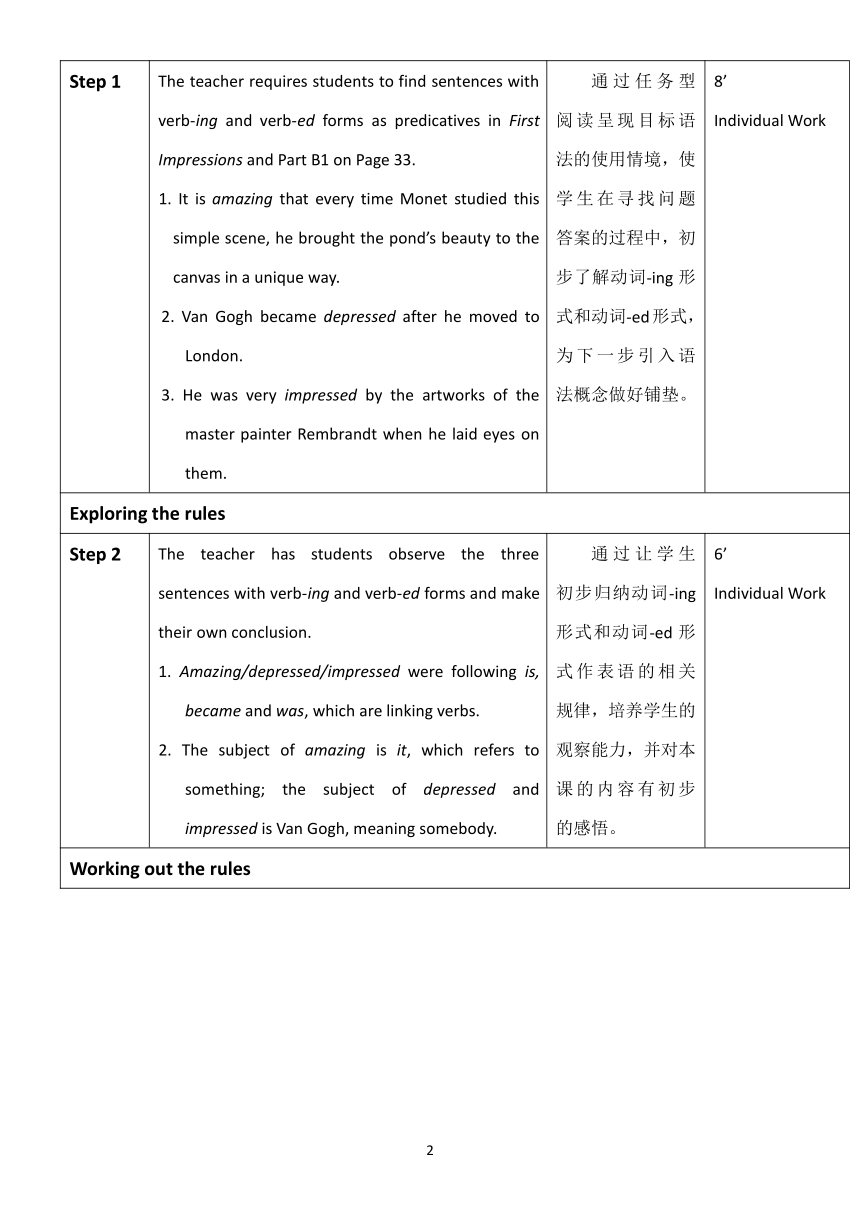人教版(2019)必修 第一册Unit 3 Sports and fitness Grammar and usage教案
文档属性
| 名称 | 人教版(2019)必修 第一册Unit 3 Sports and fitness Grammar and usage教案 |  | |
| 格式 | doc | ||
| 文件大小 | 46.0KB | ||
| 资源类型 | 教案 | ||
| 版本资源 | 人教版(2019) | ||
| 科目 | 英语 | ||
| 更新时间 | 2024-03-18 09:42:38 | ||
图片预览


文档简介
Book 1 Unit 3 The art of painting
Grammar and usage
Verb-ing and verb-ed forms as predicatives
一、教学目标
By the end of this section, students will be able to:
1. identify the use of verb-ing and verb-ed forms as predicatives;
2. work out the rules of verb-ing and verb-ed forms used as predicatives;
3. distinguish and use the right form of verb-ing and verb-ed forms to finish related tasks;
4. apply verb-ing and verb-ed forms in new situations.
二、教学重难点
1. To understand the use of verb-ing and verb-ed forms as predicatives;
2. To apply the target grammar correctly according to different situations.
三、教学过程
步 骤 教学活动 设计意图 互动时间/模式
Lead-in
Step 1 The teacher requires students to find sentences with verb-ing and verb-ed forms as predicatives in First Impressions and Part B1 on Page 33.1. It is amazing that every time Monet studied this simple scene, he brought the pond’s beauty to the canvas in a unique way.2. Van Gogh became depressed after he moved to London.3. He was very impressed by the artworks of the master painter Rembrandt when he laid eyes on them. 通过任务型阅读呈现目标语法的使用情境,使学生在寻找问题答案的过程中,初步了解动词-ing形式和动词-ed形式,为下一步引入语法概念做好铺垫。 8’Individual Work
Exploring the rules
Step 2 The teacher has students observe the three sentences with verb-ing and verb-ed forms and make their own conclusion.1. Amazing/depressed/impressed were following is, became and was, which are linking verbs.2. The subject of amazing is it, which refers to something; the subject of depressed and impressed is Van Gogh, meaning somebody. 通过让学生初步归纳动词-ing形式和动词-ed形式作表语的相关规律,培养学生的观察能力,并对本课的内容有初步的感悟。 6’Individual Work
Working out the rules
Step 3 Based on Step 2, the teacher helps students work out the rules.When used as the predicative, the verb-ing or verb-ed form is connected to the subject by a (1) linking verb. .The (2) verb-ing form is often used to describe a thing or a situation; the (3) verb-ed form is often used to describe how a person feels. 通过观察目标语法的形式与构成,总结动词-ing形式和动词-ed形式作表语的用法。 5’Individual WorkClass Work
Step 4 The teacher provides students with more examples of vocabularies with verb-ing and verb-ed forms.动词原形v.(使……)动词-ing形式adj.(令人……的)动词-ed形式 adj.(令人感到……的)frightenfrighteningfrightenedsatisfysatisfying/satisfactorysatisfiedpleasepleasing/pleasantpleaseddisappointdisappointingdisappointedtiretiringtiredboreboringboredinspireinspiringinspiredastonishastonishingastonishedamuseamusingamused 通过提供更多动词-ing和动词-ed形式的单词的例子,让学生有更直观的体会。 4’Class Work
Step 5 The teacher has students go through “Grammar notes” on Page 95 and gives explanations if necessary. 通过教材第95页单元语法讲解部分,让学生对所学语法有更深入的认识。帮助学生巩固步骤三中的语法规则,为后面的操练做好铺垫。 8’Individual Work
Applying the rules
Step 6 The teacher has students finish the following exercise.1. The job of working in a museum sounds _________ (bore).2. I was ___________ (disappoint) with the trip to the museum.3. The lecture on Western Art was very _________ (interest).4. The art teacher was not _________ (satisfy) with my report.5. It was very ________ (amaze) to know that he had become a famous artist.Sample answers:1. boring 2. disappointed 3. interesting 4. satisfied 5. amazing 引导学生结合语法规则,在单句操练中掌握动词-ing和动词-ed作表语的用法。 4’Individual WorkClass Work
Step 7 The teacher has students finish the following exercise.It has been 2 months since I arrived in Paris. I’m now a freshman majoring in art. To tell the truth, I still feel _________ (confuse) with French. It is a bit ___________ (challenge) for me to take notes quickly and exactly in class. How ___________ (discourage) it is! Sometimes, the numerous museums in Paris also make me at a loss, which is quite _________ (annoy). However, not to let my parents down, I’ll work harder to adjust to my study and life here so that my parents will be ________ (please).Sample answers:(1) confused (2) challenging (3) discouraging (4) annoying (5) pleased 通过第二部分小语篇的练习,使学生从单句上升到语篇层面,更加全面深入地理解动词-ing和动词-ed形式作表语的用法,实现“形式—意义—使用”三者的统一。 8’Individual WorkClass Work
HomeworkWrite several sentences about what kind of paintings you like and explain the reasons, using verb-ing and verb-ed forms. 2’
Grammar and usage
Verb-ing and verb-ed forms as predicatives
一、教学目标
By the end of this section, students will be able to:
1. identify the use of verb-ing and verb-ed forms as predicatives;
2. work out the rules of verb-ing and verb-ed forms used as predicatives;
3. distinguish and use the right form of verb-ing and verb-ed forms to finish related tasks;
4. apply verb-ing and verb-ed forms in new situations.
二、教学重难点
1. To understand the use of verb-ing and verb-ed forms as predicatives;
2. To apply the target grammar correctly according to different situations.
三、教学过程
步 骤 教学活动 设计意图 互动时间/模式
Lead-in
Step 1 The teacher requires students to find sentences with verb-ing and verb-ed forms as predicatives in First Impressions and Part B1 on Page 33.1. It is amazing that every time Monet studied this simple scene, he brought the pond’s beauty to the canvas in a unique way.2. Van Gogh became depressed after he moved to London.3. He was very impressed by the artworks of the master painter Rembrandt when he laid eyes on them. 通过任务型阅读呈现目标语法的使用情境,使学生在寻找问题答案的过程中,初步了解动词-ing形式和动词-ed形式,为下一步引入语法概念做好铺垫。 8’Individual Work
Exploring the rules
Step 2 The teacher has students observe the three sentences with verb-ing and verb-ed forms and make their own conclusion.1. Amazing/depressed/impressed were following is, became and was, which are linking verbs.2. The subject of amazing is it, which refers to something; the subject of depressed and impressed is Van Gogh, meaning somebody. 通过让学生初步归纳动词-ing形式和动词-ed形式作表语的相关规律,培养学生的观察能力,并对本课的内容有初步的感悟。 6’Individual Work
Working out the rules
Step 3 Based on Step 2, the teacher helps students work out the rules.When used as the predicative, the verb-ing or verb-ed form is connected to the subject by a (1) linking verb. .The (2) verb-ing form is often used to describe a thing or a situation; the (3) verb-ed form is often used to describe how a person feels. 通过观察目标语法的形式与构成,总结动词-ing形式和动词-ed形式作表语的用法。 5’Individual WorkClass Work
Step 4 The teacher provides students with more examples of vocabularies with verb-ing and verb-ed forms.动词原形v.(使……)动词-ing形式adj.(令人……的)动词-ed形式 adj.(令人感到……的)frightenfrighteningfrightenedsatisfysatisfying/satisfactorysatisfiedpleasepleasing/pleasantpleaseddisappointdisappointingdisappointedtiretiringtiredboreboringboredinspireinspiringinspiredastonishastonishingastonishedamuseamusingamused 通过提供更多动词-ing和动词-ed形式的单词的例子,让学生有更直观的体会。 4’Class Work
Step 5 The teacher has students go through “Grammar notes” on Page 95 and gives explanations if necessary. 通过教材第95页单元语法讲解部分,让学生对所学语法有更深入的认识。帮助学生巩固步骤三中的语法规则,为后面的操练做好铺垫。 8’Individual Work
Applying the rules
Step 6 The teacher has students finish the following exercise.1. The job of working in a museum sounds _________ (bore).2. I was ___________ (disappoint) with the trip to the museum.3. The lecture on Western Art was very _________ (interest).4. The art teacher was not _________ (satisfy) with my report.5. It was very ________ (amaze) to know that he had become a famous artist.Sample answers:1. boring 2. disappointed 3. interesting 4. satisfied 5. amazing 引导学生结合语法规则,在单句操练中掌握动词-ing和动词-ed作表语的用法。 4’Individual WorkClass Work
Step 7 The teacher has students finish the following exercise.It has been 2 months since I arrived in Paris. I’m now a freshman majoring in art. To tell the truth, I still feel _________ (confuse) with French. It is a bit ___________ (challenge) for me to take notes quickly and exactly in class. How ___________ (discourage) it is! Sometimes, the numerous museums in Paris also make me at a loss, which is quite _________ (annoy). However, not to let my parents down, I’ll work harder to adjust to my study and life here so that my parents will be ________ (please).Sample answers:(1) confused (2) challenging (3) discouraging (4) annoying (5) pleased 通过第二部分小语篇的练习,使学生从单句上升到语篇层面,更加全面深入地理解动词-ing和动词-ed形式作表语的用法,实现“形式—意义—使用”三者的统一。 8’Individual WorkClass Work
HomeworkWrite several sentences about what kind of paintings you like and explain the reasons, using verb-ing and verb-ed forms. 2’
